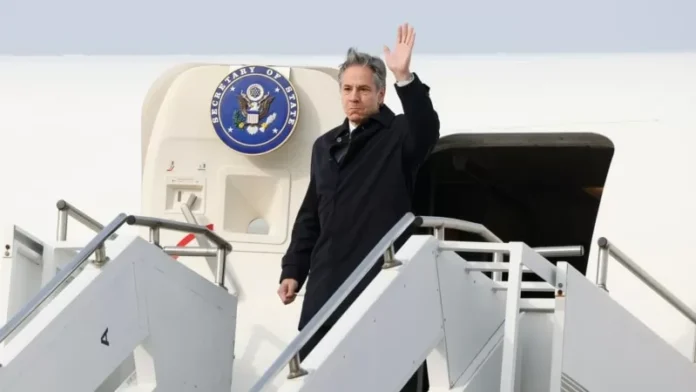Seoul, South Korea — U.S. Secretary of State Antony Blinken arrived in South Korea on Sunday, kicking off a brief Asia tour that will also include the Philippines. This visit comes as the United States looks to strengthen its ties with two key regional allies.
Blinken’s first stop was Seoul, where he landed on Sunday afternoon ahead of the third annual Summit for Democracy on Monday. This summit is an initiative of U.S. President Joe Biden and is being hosted by Seoul this week.
Before arriving in Seoul, Blinken made a brief stop in Bahrain, where he met with King Hamad bin Isa Al-Khalifa to discuss efforts to achieve a cease-fire in Gaza.
The Summit for Democracy, which runs from March 18-20, will bring together government officials, NGOs, and civil society members to discuss important issues related to democracy. This event is significant not only for South Korea but also for the entire region, as it highlights the importance of democracy and the need to protect it.
Seoul has been a crucial ally of the United States, and the presence of about 27,000 American soldiers in the South is a testament to this strong partnership. The U.S. military presence in South Korea is aimed at protecting the country from the nuclear-armed North, which has been a constant threat to regional stability.
Under the leadership of conservative President Yoon Suk Yeol, South Korea has worked towards strengthening its ties with the United States. President Yoon has also taken steps to improve relations with Japan, a former colonial power, in order to better guard against the threats posed by North Korea.
During his visit, Blinken will meet with South Korean Foreign Minister Cho Tae-yul to discuss ways to further enhance this crucial alliance. One of the key topics of discussion will be how to improve the alliance’s “extended deterrence” against North Korea.
The Summit for Democracy has attracted some criticism for its selective invitation list, which excludes countries that consider themselves democratic, such as Thailand and Turkey. However, the presence of South Korea and the United States at this event highlights their commitment to promoting and protecting democracy in the region.
After his visit to Seoul, Blinken will head to Manila, where he will reaffirm the United States’ unwavering commitment to its Philippine ally. State Department spokesperson Matthew Miller stated that Blinken’s visit will also include meetings with local officials, including President Ferdinand Marcos Jr.
One of the key issues likely to be discussed during Blinken’s visit to Manila is the ongoing tensions with China, especially regarding the disputes over the South China Sea. The United States is working to strengthen its ties with regional allies like the Philippines to counterbalance China’s growing influence in the region.
Recently, China accused the United States of using the Philippines as a “pawn” in the South China Sea dispute. The tensions between the two countries have escalated in recent years due to clashes around contested islands in the waters.
China claims almost the entire South China Sea, disregarding competing claims from other Southeast Asian nations and an international ruling that declared its stance as baseless. The South China Sea is strategically vital for several countries, including China, as it serves as a key route for the import and export of essential goods such as fuel and food.
In recent years, China has rapidly expanded its naval forces and claimed vast territories in the South China Sea, aiming to project its military and political power beyond its shores. The United States is closely monitoring these developments and is working with regional allies to ensure the stability and security of the region.
In conclusion, the visit of U.S. Secretary of State Antony Blinken to South Korea and the Philippines highlights the strong partnership between these countries and the United States. The Summit for Democracy and the discussions on how to improve the alliance between South Korea and the United States demonstrate their commitment to promoting democracy and maintaining regional stability. As the United States continues to strengthen its ties with its allies, it sends a clear message to China that its aggressive actions in the South China Sea will not be tolerated.

